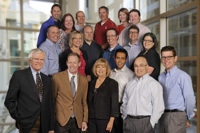If there is a tired cliché that I’d love to have disappear, it’s that the United States is not a consistent dairy exporter. That changed at least five years ago,” said Peter Gutiérrez, vice president of global ingredient sales, of Methuen, Mass.-based Agri-Mark.
Gutiérrez should know. Agri-Mark has done more than its share to change the United States’ reputation from a casual exporter dabbling in foreign markets to a major player on the world stage. In fact, Agri-Mark’s passion for exports, success in building its now-sizable international business and extensive precompetitive efforts to elevate whey protein as a high-value ingredient are why Dairy Foods named the company the recipient of the 2013 Tom Camerlo Exporter of the Year award.
Since it began marketing whey products overseas in 2003, Agri-Mark has grown into an export force, annually shipping 15% to 20% of its nonfat dry milk, around 60% of its whey protein concentrate (WPC) and at least 95% of its whey permeate to more than 30 countries.
“Agri-Mark has a pioneering spirit and is bold in pursuing export opportunities in diverse markets around the globe,” said Marc Beck, executive vice president, strategy and insights, U.S. Dairy Export Council, Arlington, Va. “Name a country on the map, and Peter has probably been there as a memorable ambassador for U.S. dairy.”
Backbone of success
Ambassador is an apt descriptor. A large part of Agri-Mark’s export success is directly attributable to its personal, hands-on approach.
“We invite our customers to come see our plant, go out to our farms, meet our people. We especially do that with overseas visitors. Many customers haven’t seen the back end of a cow,” said Gutiérrez. “At the end of the day, it is the human factor — meeting people face to face — that builds the business. Phone and email are great but you have to put a face behind the voice. You need to go in with your hands above the table and a smile on your face and earn their confidence,” Gutiérrez said. “The exchange of information will allow you to become friends and, hopefully, their vendor of preference.”
Agri-Mark’s customer-oriented service carries through all aspects of the manufacturing, sales and distribution processes.
The company regularly works with end users to start a dialogue, determine their experience with WPC and permeate, and often offer usage instruction. Despite the growing popularity of whey ingredients, many buyers, particularly smaller companies, still lack knowledge of the intricacies of WPC applications, functionality, nutrition and regulation.
“When you get close to their R&D people, you find out exactly what it is they are looking for,” said Gutiérrez.
The company literally goes extra miles to meet customer expectations. In June, for example, Agri-Mark sent samples of WPC80 to an infant formula buyer that requires pre-shipment testing. The customer turned down the full shipment, claiming its tests indicated high nitrite levels. But because the customer was under a tight deadline, Agri-Mark took extraordinary steps.
“We airlifted 5 tons across the water,” said Gutiérrez. “Two months later, I received an email from the same purchaser: ‘Peter, our lab goofed. The product you originally sent in June was perfect.’ We spent $15,000 in air freight when we really didn’t have to.”
The retraction did not surprise Agri-Mark. The company has spent around $100 million to upgrade plant operations over the past decade with an eye toward quality. That included a new warehouse at its Middlebury, Vt., whey plant in 2010 specifically to facilitate exports.
All four Agri-Mark manufacturing plants — Cabot and Middlebury, Vt.; Chateaugay, N.Y.; and West Springfield, Mass. — are in their fourth year of SQF 2000 Level 3 certification, which has had a direct and positive impact on product quality and export success.
In 2003, 90% of Agri-Mark’s WPC 80 went into sports nutrition. Now, less than 40% does, with the remainder used in higher-value applications like infant and medical nutrition. For permeate, close to 70% goes into human food rather than pig feed — “among the highest of all the whey permeate producers in probably the globe,” Gutiérrez said.
“We’ve slowly recognized internally how good our product really is, and we continue to adapt and make sure we are investing in processes and lab tests that we didn’t do five years ago,” said Gutiérrez . “But at the end of the day, Agri-Mark’s forte is that a high percentage of Cabot Cheddar cheese is aged 12 to 48 months. To make cheese stored that long, you have to have incredibly clean milk. Our farmers do an incredible job to ensure proper dairy barn sanitation and have a very healthy milking herd. What we look for in cheese provides similar benefits to the whey side of the business.”
Roots of the whey operation
Middlebury manufactures 21,000 tons of whey permeate, nearly 4,000 tons of WPC and 6,500 tons of other whey products annually. The decision to build and commission the plant was really the start of Agri-Mark’s export surge. But it might just as easily never have happened.
Agri-Mark is a relatively small co-op with just 1,200 family farms. The $20 million whey plant built in 1999 — a completely new business at the time — was a major undertaking.
In the mid-1990s, the co-op was still focused on its recent merger with Cabot, and to top it off, “milk prices were horrible at the time,” said Richard Stammer, Agri-Mark’s chief executive officer.
The co-op held a meeting of its farmer-representatives to explain the plans, and they voted in favor.
“It was remarkable under the circumstances,” Stammer said. “It is a tribute to our farmer-members who had the wisdom to invest in a whey protein facility when the market was still in its infant stages.”
It helped that the facility would create a new revenue stream and eliminate rising whey disposal costs. In addition, Agri-Mark had already lined up a buyer to take the first three years of production and significantly alleviate sales pressure.
In October 2000, Agri-Mark made its first shipment of WPC 80 from Middlebury. Within a few years, the company had calls from both domestic and overseas customers looking for WPC 80 and whey permeate.
“Our entry into the export market and the success that we have had for a small cooperative is really a tremendous risk-to-reward story,” Stammer said.
The past six years have been the most profitable in the history of Agri-Mark. In 2012, milk and manufactured product sales reached $880 million. (The co-op ranks No. 38 on the Dairy 100, Dairy Foods’ annual ranking of the largest dairy companies based in the United States and Canada.) Profits exceeded $10 million, in addition to a record $21 million paid to its farmers for high milk quality and other premiums.
For the greater industry good
While Agri-Mark has kept a clear eye on growing its own export business, the company has also been an eager and energetic force in expanding U.S. dairy exports as a whole. Agri-Mark was one of the founders of the Whey Protein Research Consortium, a precompetitive forum to fund research into whey protein’s health benefits.
“Those efforts ultimately help everyone,” said Gutiérrez. “A high tide raises all boats. As an industry, we’ve done a good job of creating excitement about whey proteins.”
Gutiérrez is also an active participant in the whey promotional efforts of the American Dairy Products Institute, is a former vice chairman of the USDEC Ingredient Committee, plays an active role in USDEC’s Market Access & Regulatory Affairs and Trade Policy Committees, and represents Agri-Mark and U.S. dairy at trade shows like the Middle East’s Gulfood and on USDEC reverse trade missions that bring overseas buyers to the United States to build relationships with suppliers.
“Agri-Mark has always looked at exports strategically with a clear idea of how to build sales across its product lines,” said USDEC President Tom Suber. “Just as importantly, it has actively contributed to and led efforts to develop the industry’s export tools to bring pre-competitive commercial impact.”
The company continues to work in concert with USDEC and others to create new and potentially large market opportunities. Agri-Mark helped USDEC prepare a 70-page document, subsequently translated into Chinese and presented to the Chinese Ministry of Health, to prove that whey permeate is a safe ingredient for food use. Outdated Chinese regulations allow permeate only in pig feed, and the country is extremely cautious to revise its food code given recent food safety issues.
“China and India have two of the largest cookie and biscuit industries in the world. Just think of the financial return to U.S. dairymen if we could get U.S. whey permeate into China and India for human food applications,” said Gutierrez.
“Agri-Mark stands out for its passion about opening the door to new opportunities for U.S. dairy exports, whether that is removing market access barriers to U.S. dairy in India or Russia or overcoming constraints that prohibit the use of whey permeate for food in China,” said Kristi Saitama, USDEC vice president, export marketing ingredients.
Long-term vision
Market opening takes time. But Agri-Mark expects that. Its vision has always been long-term.
“I was on the first USDEC trade mission in 1996, and one company I met on that trip still buys products from us,” said Gutiérrez.
Agri-Mark has provided whey product samples to dairy science departments at U.S. universities, as well as for the inaugural USDEC Whey Protein Food Science Student Product Innovation competition in Egypt in 2012.
“We are planting seeds that are not going to produce sales results in near term. But in three to five years, those seeds germinate,” said Gutiérrez. “One thing we want to do is have our brand name recognized by these students doing nutritional and product development. When they see the Agri-Mark bag in their university lab, then graduate and go to the industry, they might say, ‘Hey I remember that Agri-Mark bag and that logo.’”
Also in its long-term sights is Africa, which Gutiérrez calls the last great frontier, with “huge opportunities for U.S. dairy.”
A greater cheese presence internationally is another possibility. Although Cabot brand cheese can be found at retailers throughout the world, cheese has not been an export priority — mainly due to the company’s overall cheese strategy.
“We make high-end Cheddar. We want to go up the value chain. We have invested many millions of dollars in a state-of-the-art cut-and-wrap facility in Cabot,” said Gutiérrez . “We really don’t want to export 40-pound blocks of cheese. We want to export in retail packaging, and we are looking for opportunities to do that.”
Gutiérrez believes not only Agri-Mark but the entire U.S. industry is on the right track. He points to recent U.S. projects to build whole milk powder (WMP) capacity to target exports as “a great thing . . . as long as the product being manufactured is the product desired by foreign buyers.”
He believes it might take a while for the United States to make a name in the global WMP sector, but he has no doubts we will get there.
“I have huge respect for other dairy powder producers in this country. Everyone wants to make a better product all the time. As a nation, we are making a better quality exportable dairy powder, whether it is lactose, nonfat dry milk, whey or WPC80,” said Gutiérrez. “I believe we are a consistent exporter. I also truly believe that anywhere in the world where you see ‘Made in USA’, it commands respect, admiration and consumer confidence that it is a quality product.”
Paul Rogers, a writer from Madison, Wis., reports on the dairy industry.
The Tom Camerlo Exporter Of The Year
- 2013 Agri-Mark
- 2012 Glanbia USA
- 2011 Leprino Foods
- 2010 United Dairymen of Arizona*
- 2009 Hilmar Cheese
- 2008 Schreiber Foods
- 2007 Darigold
- 2006 Davisco Foods
Note: In 2010, the award was renamed to honor James P. “Tom” Camerlo, a long-time dairyman and former chairman of the U.S. Dairy Export Council.




